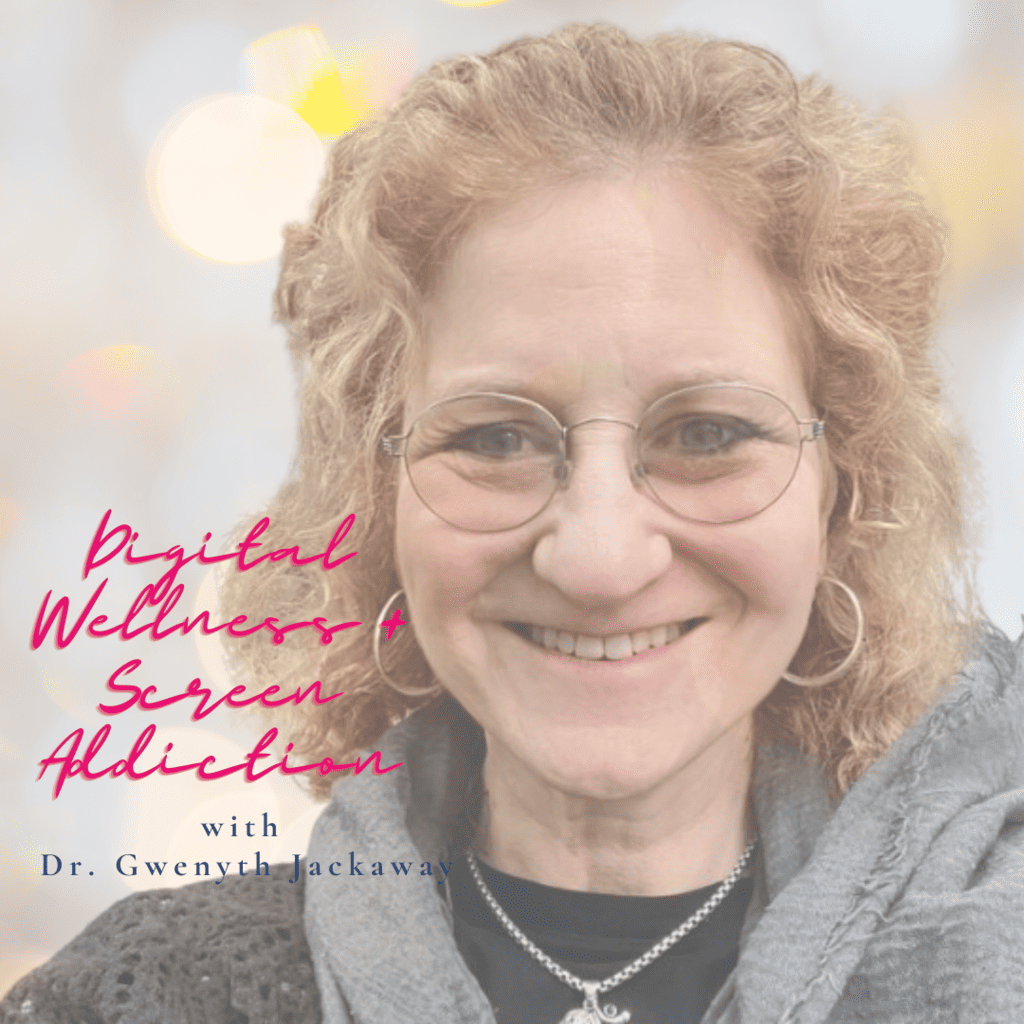Podcast: Play in new window | Download
Subscribe: Apple Podcasts | Spotify | Amazon Music | RSS | More
Digital Wellness + Screen Addiction
Think about this! If we have metered usage of our smartphones or tablets, scrolling into Facebook, YouTube, Instagram and other social media apps, how much time will it give you being glued on your devices? To be candid, the average daily screen time globally is estimated to be approximately seven hours. That’s jaw dropping, right?
There is a neuroscience explanation why it is hard for people, especially the young ones, to come off their phone. In this episode, Susie had an enlightening conversation with Dr. Gwyneth Jackaway, an advocate for digital wellness, as they explore the realm of screen addiction, shedding light on the challenges, especially for the younger generation, and providing valuable insights and solutions.
The double-edged metaphor of communications technology:
Being social beings, communication holds immense significance for us, constituting a central aspect of the human experience. In the early stages of human history, our communication tools were primarily limited to speech, body language, clothing, dance, and music. However, as time progressed, new devices such as the printing press, telephone, television, and radio emerged, ushering in significant changes in communication technology with each generation.
While communication brings about numerous benefits, it also has a dark side. Just as knives are used for good, to prepare food, for surgery, it can hurt somebody including yourselves. As we navigate the journey of parenting, it is crucial to keep a vigilant eye on our children and guide them through their childhood and adolescent years, fostering intentional digital well-being.
Listen in to this episode to learn:
- Dr. Gwenyth’s background and how she got into digital technology?
- The metaphor of new technology as a double-edged sword (The dark side of technology)
- What motivated Dr. Gwenyth Jackaway to get involved in digital wellness?
- What is digital wellness all about?
- Intentional attention as an aspect of digital wellness.
- The neuroscience explanation why it is hard for the the young ones and even adults to come off their devices.
- How does Dr. Gwenyth Jackaway suggests promoting digital wellness with adults?
- How can parents model intentional digital wellness to younger kids and teenagers?
- What is the Carrots and Cake app and how does it work?
- How to get the 60-day free trial offer courtesy of Dr. Jackaway for Carrots and Cake app?
Journal Questions for listeners to start intentional online use from devices:
Here are some examples of questions I like clients to ponder:
- As parents, what strategies can you implement to help our children develop self-control and self-regulation with technology use?
- What practical tips from Dr. Jackaway that you can use to resist the urge to start your day with phone use.
- What are your views on the team approach suggested by Dr. Jackaway for families to manage digital device impacts? Do you think it will be effective?
- It is hard, especially for teenagers, to understand digital monitoring. Will you set a time to watch “The Social Dilemma” on Netflix with the family, so that they will understand why you are enforcing digital monitoring?
- How can we bring mindfulness into our relationship with our devices and consciously reclaim your time and attention away from digital addiction?
- What do you think about the idea of Carrots and Cake that we should eat our vegetables before we can have dessert?
Digital addiction isn’t an accident!
This assertion holds true, and it’s not a random occurrence. Rather, it’s a deliberate design. Silicon Valley’s team of consultants, experts in neuroscience and psychology, strategically employs persuasive design principles in the creation of our devices. This intentional design is particularly evident in the development of highly addictive platforms like Facebook, YouTube, TikTok, and others. The allure of these platforms, coupled with their free accessibility, keeps users returning for more. The more we get ‘likes’, retweets and shares, our innate desire as social creatures to gain approval and establish a sense of community gets the upper hand.
Another reason is that these platforms are free to use. You don’t pay Facebook or YouTube or Instagram to use them. The seemingly free nature of these platforms conceals a different reality. We do not directly pay for the service, but in doing so, we unwittingly become the product. They gather data of your use, what you are doing on their site and then feed you with more stuff in order for you to come back for more. Next, they sell your data to an advertiser. That’s the business model of persuasive design.
Find support here:
⭐️Find the NEW LIFE AUDIT HERE
⭐️See if the Love Your Life School is open for enrollment here
⭐️Did you love this episode? Make sure you’ve listened to all the foundational episodes of the Love Your Life Show. Get the free Podcast Roadmap here
⭐️Do you get my weekly Wednesday email? I share a whole bunch of fun things, things that are happening in my life, products I’m using, books warriors are reading, etc! Come join the fun here!
⭐️Are we friends on Instagram? Let’s catch up!
⭐️I’ve been sharing videos of my life in Australia on Facebook – I’d love to be friends with you there too!
⭐️Grab some of my favorite books and products here
⭐️For the price of a coffee, Support Susie and the Love Your Life Show
⭐️Have a child between the ages of 9-25? Learn the basics to support your changing child here
Other links:
For an exclusive 60-day free trial, courtesy of Dr. Jackaway, go to carrotsandcake.com and use the code “LOVE YOUR LIFE”
The Social Dilemma, a documentary-drama which is on Netflix
Carrots and Cake, a parental control learning platform





